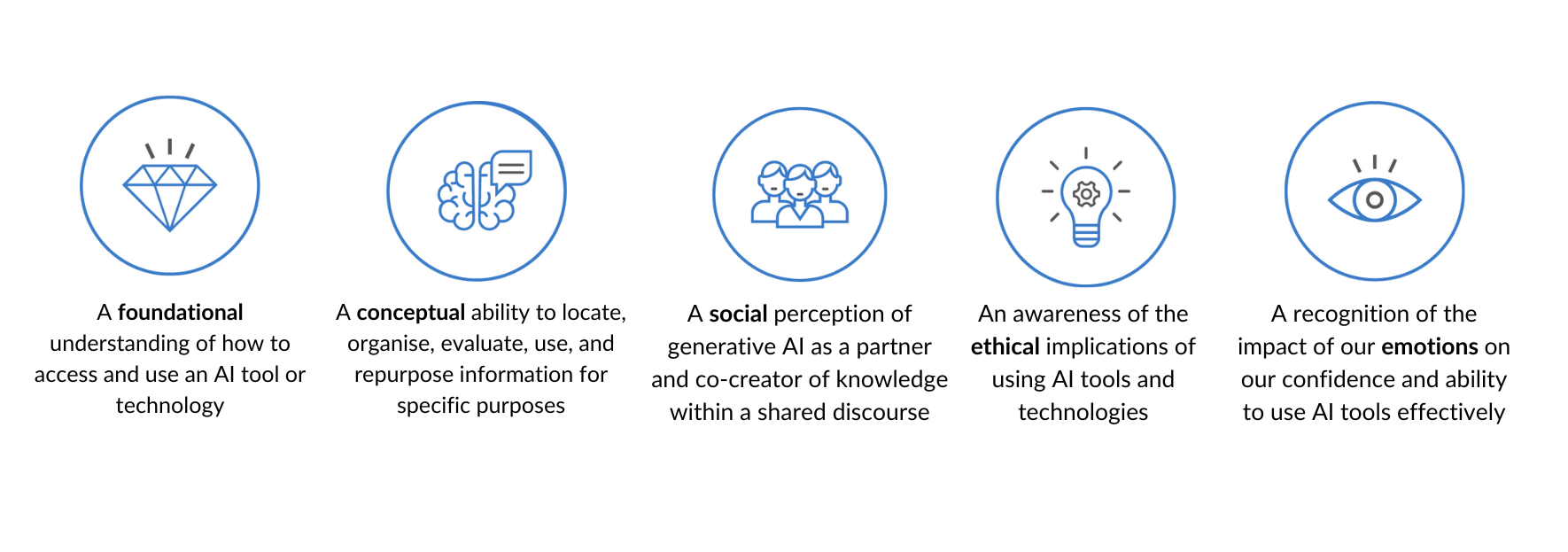Subscribe for Updates (KnE Clues)
"*" indicates required fields
How to develop your AI literacy

AI literacy is understanding “how to communicate effectively and collaboratively with generative AI technologies, as well as evaluate the trustworthiness of the results obtained” (Pretorius, 2023)
Some are concerned that AI might replace individuals in the workforce. While it is true that AI could change our understanding of the skills needed for employability, we can also acknowledge its potential to be a great tool, enabling professionals to do more with their time. By freeing researchers and other professionals from mundane tasks, AI can empower individuals to focus on higher-order thinking and research skills – things that AI cannot yet replicate.

WHAT ARE THE DIMENSIONS OF AI LITERACY THAT I SHOULD BE AWARE OF?
Building confidence in using and collaborating with AI tools and technologies can be done within the lens of an AI literacy framework. We’ll briefly cover the five dimensions of Dr. Lynette Pretorius’ AI literacy framework, designed to help educators and researchers cultivate a culture of AI literacy in higher education and research.
There are five dimensions within Dr. Pretorius’ AI literacy framework:


KNE CLUE: HOW TO USE THE AI LITERACY FRAMEWORK
The five dimensions of the AI literacy framework can help you gauge your current level of AI literacy and the areas in which you wish to develop.
Let’s take a closer look at how the five dimensions apply to AI tools and technologies commonly used in higher education and research.

Foundational
The foundational dimension is all about the basics. To use generative AI effectively, you need a solid understanding of how to access and navigate these platforms. A good example is the myriad of online courses and workshops available that cover foundational skills in AI use, including Learn the Basics of AI offered by KnE Learn and led by Dr. Lynette Pretorius.

Conceptual
The conceptual dimension isn’t just about using the platforms—it’s about knowing how to find, organise, evaluate, use, and repurpose information to meet your specific needs. A good example is the Elicit platform. As it continues to evolve with each upgrade, it is important to know how to prompt to find specific information, how to store the information it generates (whether on the platform or locally), and how to use and repurpose that information to guide or support your research.

Social
Within the social dimension, working together with AI, you and the technology can create a shared discourse to achieve your goals. Continuous prompting of tools like Elicit or ChatGPT not only train the AI model, but ensure that your request is fine tuned and your input becomes an integral part of the information the AI tool generates.

Ethical
The ethical implications of using information generated by AI tools is a hot topic right now and for good reason! As a researcher, it is important to be aware of how you use the information generated by AI tools. Does your institution or the journal you are publishing in have a policy on the use of AI generated information? Are you using AI generated information purely to guide your research or has it found its way into your publication? These and more are all questions to be aware of as you develop the ethical dimension of your AI literacy.

Emotional
The emotional dimension is about acknowledging that your emotional responses can influence how you interact with and interpret AI-generated content. By developing this awareness, you can build confidence in your abilities to use AI and make more informed decisions about how to integrate AI into your work.
Think of AI as a powerful assistant that can handle repetitive tasks, analyse large datasets, and even generate creative content. In academia, this means using AI to automate administrative tasks, provide personalised feedback, or even assist in research by analysing vast amounts of data quickly and accurately. So, don’t be intimidated by the rapid development of AI. Embrace it, learn to work alongside it, and use it to your advantage.
Diving Deeper
Want to learn more about how to develop your AI literacy to effectively collaborate with AI in your career as a researcher?
Enrol in our three-course Professional AI Use in Higher Education programme for in-depth explanations and walkthroughs of AI literacy development, incorporating AI into daily research tasks, recognising the impact of AI, developing ethical standards for AI use, and creating plans to continue AI learning.